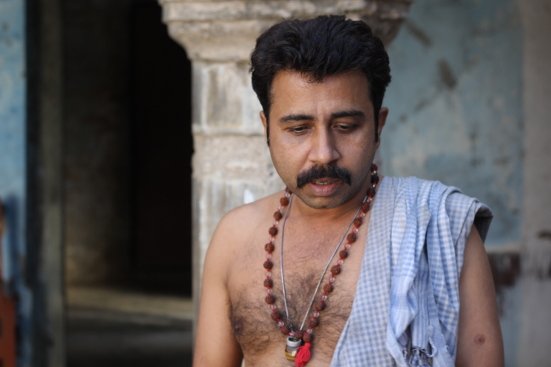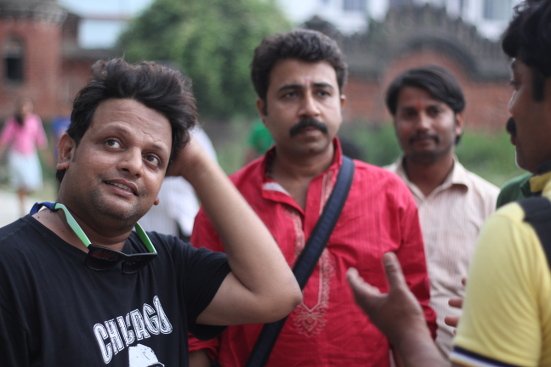
Mithili Makhaan recently won for Best Maithili Film at the 63rd National Film Awards and had a world premiere at the International Film Festival of South Asia in Toronto. While here in Toronto, Minority-Review’s Swati Sharan had a chance to catch up with Nitin Neeru Chandra, the director of the film.
Do read our review of the film here.
Also, some background about the terms Mithili and Maithali: Maithili is both a girl’s name and the name of a Bihari dialect. So the dialect of Hindi being spoken in the film is Maithili. Kranti meets Maithili who is the heroine. (Maithili as a name is also (Ramayan) Sita’s name as she was from the Mithila area, which of course is this area of modern day Bihar). Now in the context of paintings, Madhubani style of paintings are also referred to as Mithila paintings.
There are some who believe that change can happen in Bihar slowly and without making a big show about it. Is this what you were trying to prove with Mithili’s central character?
Yes, change can happen slowly. And even with Kranti’s character, it’s the same. He’s focused on his work and was sincere in his efforts. And maybe there’s more noise with him because a lot of people are involved in helping him in the makhaana (lotus seed) processing.
Maithili (Anurita Jha) and Kranti (Kranti Prakash Jha) are both leading a silent revolution. The people who speak loudest usually don’t do much.

Pankaj Jha in Mithila Makhaan
You seem to be focusing on people becoming more entrepreneurial to make Bihar thrive again. But amongst the more privileged, there’s a notion of not wanting to start out small and see things change gradually. What’s your take on this?
See, I come from a business family. My father and grandfather were both in the construction business. But 99% of the time, Biharis are service people. They don’t want to take risks, unlike Marwaris or Sindhis.
As for not starting out small, we are so big, why start small? We don’t consider ourselves to be less than kings. This is the thought process amongst the better-off Biharis. They don’t realise how many businessmen started out small, whether it’s Bill Gates, Donald Trump or Narayan Murthy. Azim Premji started out selling soap. Dhirubhai Ambani started by selling masalas. So you need to take a leap of faith before taking a big step forward.
As for trying to make things better, we get beaten in every state. And I know this because I have lived in 13 to 14 states in India. Biharis have the least sense of ownership towards their state. Do you know that, in fact, the word Bihari has been registered as a swear word on youswear.com?
And there’s such a feudal mindset, which perhaps fuels our sense of escapism wherever we go. So if people are trying to get away, when will they do anything? Like even in Toronto, when I tried to get funding for my previous film from the Biharis living here, they would reject me with the excuse, “If you made a Hindi film, we would support you but not with a Bhojpuri film.” Now a Hindi film would not cost less than 4-5 crore rupees and that’s much tougher to promote. So it’s like they’re trying to make you deviate from your path by phrasing things this way.
People in the Tamil, Telegu or Punjabi community abroad ask after their counterparts. Biharis don’t do that abroad. In fact, when I went to New Jersey in the U.S. for a special screening of my film, the organisers shut it off 20 minutes before it was over. When I asked why, they said people wanted to watch the Superbowl (a famous American football match). I was stunned. So this is what we’re up against to make Bihar thrive.

Director Nitin Neeru Chandra with Pankaj Jha on set
Being an Indian based in India, how did you chance upon the NRI scene with the Bihar and Jharkhand Association’s lack of donations for a scholarship?
See, I’ve lived in five countries including Singapore and Dubai. I like to find out about things. So one day I was speaking with some of the Biharis in these places about the challenges of making a Bhojpuri film. So I was telling them how cinema is basically literature. And if Bhojpuri films are supposedly ‘bad’ or ‘uncool’, who was it that made it that way? You or us by not supporting it? One of the NRIs replied that they can’t even get Biharis abroad to donate $50 for a scholarship so what was I expecting in terms of support for films?
Are there NGOS you’ve gotten in touch with since the film came to be?
I tried with the Archaelogical Survey of India but there was a lot of politics surrounding it. In general, the sense of belonging is low to protect or preserve things. There’s zero support and more leg pulling.

Kranti Prakash Jha in Mithila Makhaan
But what about approaching the particular private entities that run a specific institution?
There’s just such a nexus or combination of politics, crime and real estate builders that it proves difficult. We don’t have a Thackeray or Karunanidhi to fight for what’s there. There’s nobody fighting for preservation. And where that’s not the case, then it’s like everyone’s left Patna. Take for instance Rizwan Castle near Dak Bungalow Road in Patna. It was earlier in dispute over who owns what and now it lies abandoned.
See, this is all a sign of a downturn. In Bihar, there were five major dialects and now they’re in gradual cultural decline. It’s to the point that in Darbhanga (which was known for Maithili), no one is speaking Maithili on the streets there.
When is your film Maithili Makhaan releasing in India and where?
The release date isn’t known yet. But it is due to release in Bihar, Jharkhand, Nepal, West Bengal, Mumbai and of course, (with a chuckle) Bihar’s capital Delhi.
Watch the trailer of the film:



0
comments